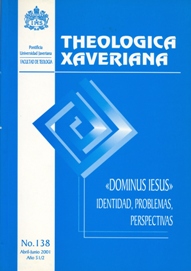Abstract
La teología restrictiva y el lenguaje excluyente utilizados en la declaración Dominus Iesus, nos conduce a un detenido examen sobre el sentido que la Iglesia le ha dado al delicado tema de la universalidad de la salvación. Éste nos lleva a la búsqueda de una teología dinámica y contextual que desde el diálogo y la apertura construya no sólo un nuevo lenguaje que responda a la problemática del hecho religioso mundial, sino unos contenidos doctrinales adaptados a los nuevos areópagos de nuestro tiempo. Procurar elaborar una teología incluyente que haga de la Iglesia una verdadera comunidad de bautizados y no una institución jerarquizada, es un desafío al cual la ciencia teológica debe responder desde la perspectiva del pluralismo religioso en el contexto real del hombre contemporáneo. Urge pensar una teología de la inclusión que acoja, respete y valore la expresión religiosa de quienes creen distinto a nosotros.
This journal is registered under a Creative Commons Attribution 4.0 International Public License. Thus, this work may be reproduced, distributed, and publicly shared in digital format, as long as the names of the authors and Pontificia Universidad Javeriana are acknowledged. Others are allowed to quote, adapt, transform, auto-archive, republish, and create based on this material, for any purpose (even commercial ones), provided the authorship is duly acknowledged, a link to the original work is provided, and it is specified if changes have been made. Pontificia Universidad Javeriana does not hold the rights of published works and the authors are solely responsible for the contents of their works; they keep the moral, intellectual, privacy, and publicity rights.
Approving the intervention of the work (review, copy-editing, translation, layout) and the following outreach, are granted through an use license and not through an assignment of rights. This means the journal and Pontificia Universidad Javeriana cannot be held responsible for any ethical malpractice by the authors. As a consequence of the protection granted by the use license, the journal is not required to publish recantations or modify information already published, unless the errata stems from the editorial management process. Publishing contents in this journal does not generate royalties for contributors.


